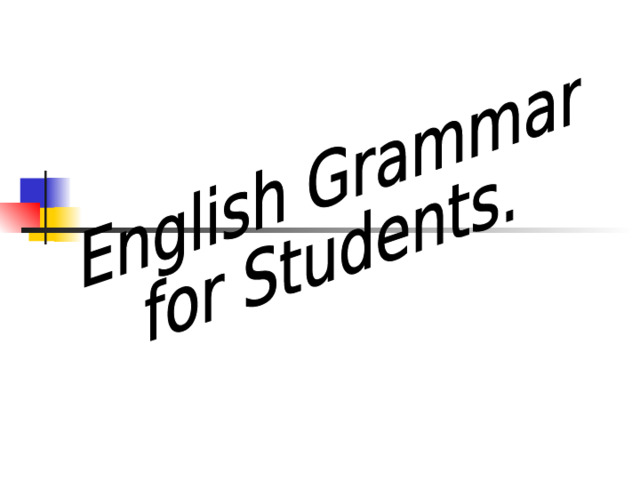
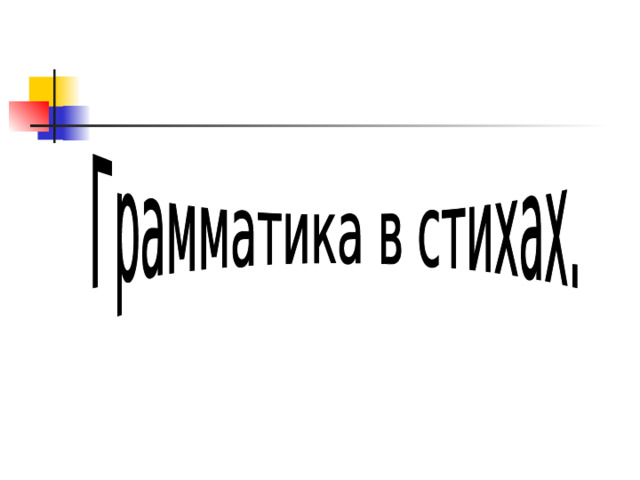
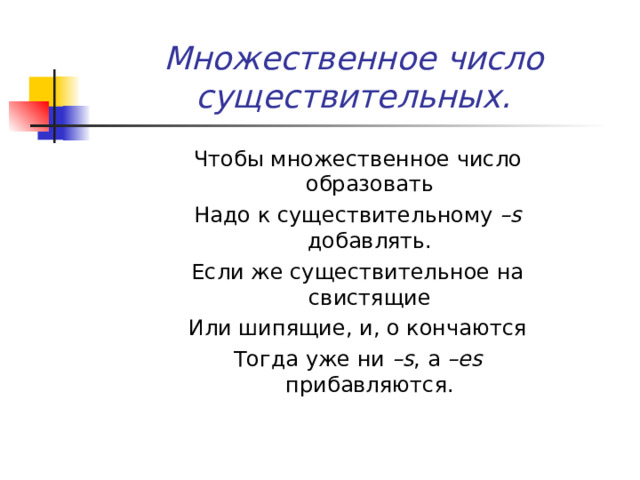
Множественное число существительных.
Чтобы множественное число образовать
Надо к существительному – s добавлять.
Если же существительное на свистящие
Или шипящие, и, о кончаются
Тогда уже ни –s , а –es прибавляются.
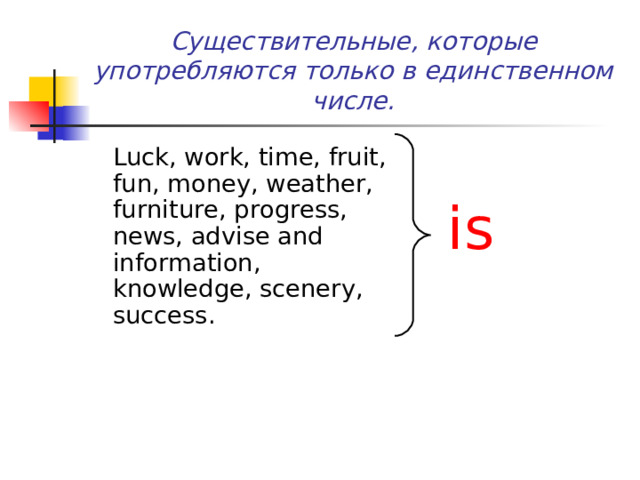
Существительные, которые употребляются только в единственном числе.
Luck, work, time, fruit, fun, money, weather, furniture, progress, news, advise and information, knowledge, scenery, success.
is
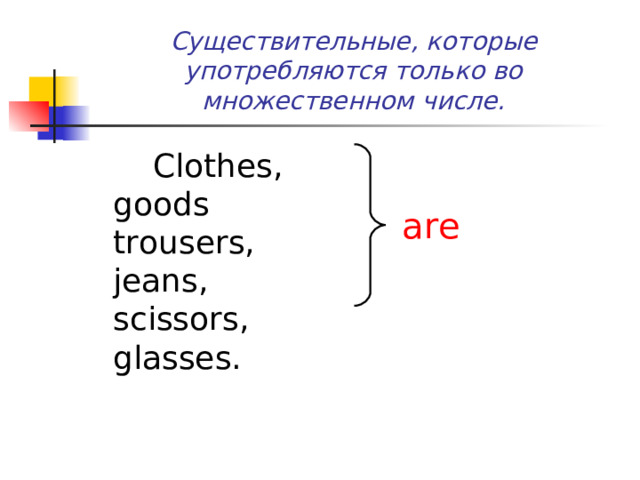
Существительные, которые употребляются только во множественном числе.
Clothes, goods trousers, jeans, scissors, glasses.
are
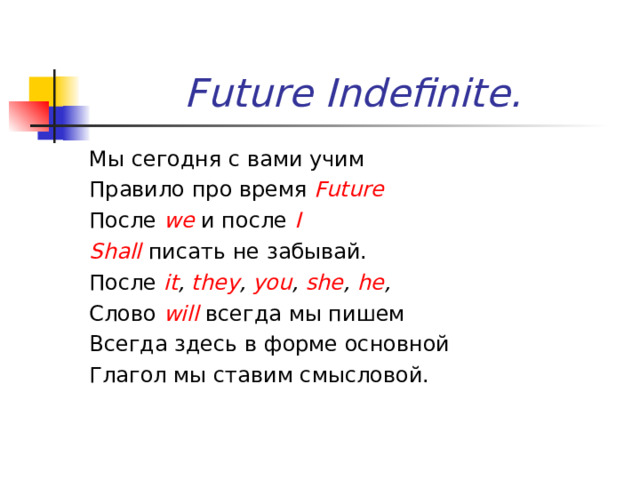
Future Indefinite.
Мы сегодня с вами учим
Правило про время Future
После we и после I
Shall писать не забывай.
После it , they , you , she , he ,
Слово will всегда мы пишем
Всегда здесь в форме основной
Глагол мы ставим смысловой.
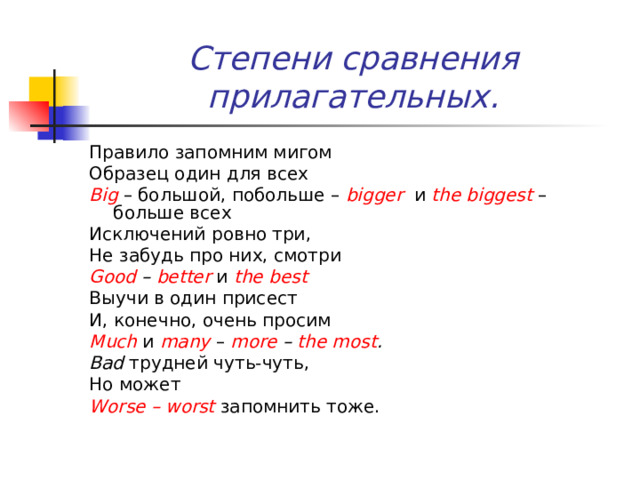
Степени сравнения прилагательных.
Правило запомним мигом
Образец один для всех
Big – большой, побольше – bigger и the biggest – больше всех
Исключений ровно три,
Не забудь про них, смотри
Good – better и the best
Выучи в один присест
И, конечно, очень просим
Much и many – more – the most .
Bad трудней чуть-чуть,
Но может
Worse – worst запомнить тоже.
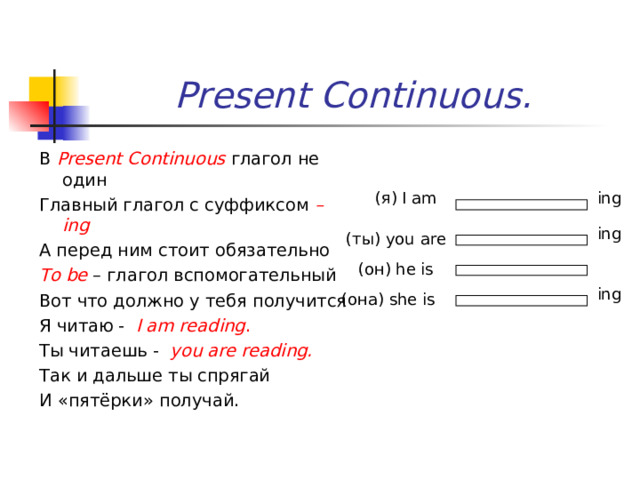
Present Continuous.
В Present Continuous глагол не один
Главный глагол с суффиксом – ing
А перед ним стоит обязательно
To be – глагол вспомогательный
Вот что должно у тебя получится
Я читаю - I am reading .
Ты читаешь - you are reading.
Так и дальше ты спрягай
И «пятёрки» получай.
ing
(я) I am
ing
( ты ) you are
( он ) he is
ing
( она ) she is
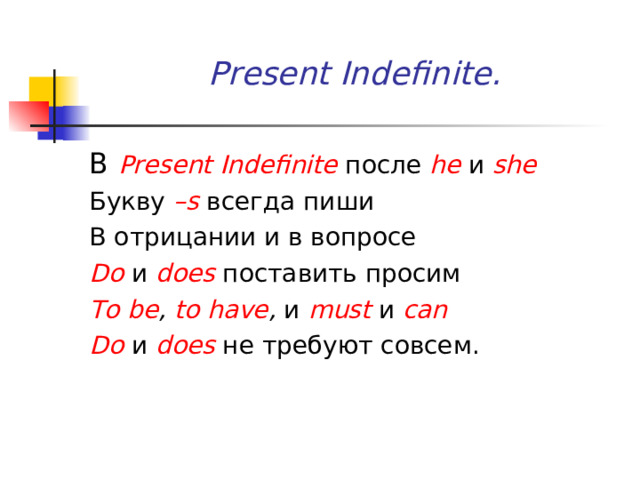
Present Indefinite.
В Present Indefinite после he и she
Букву –s всегда пиши
В отрицании и в вопросе
Do и does поставить просим
To be , to have , и must и can
Do и does не требуют совсем.
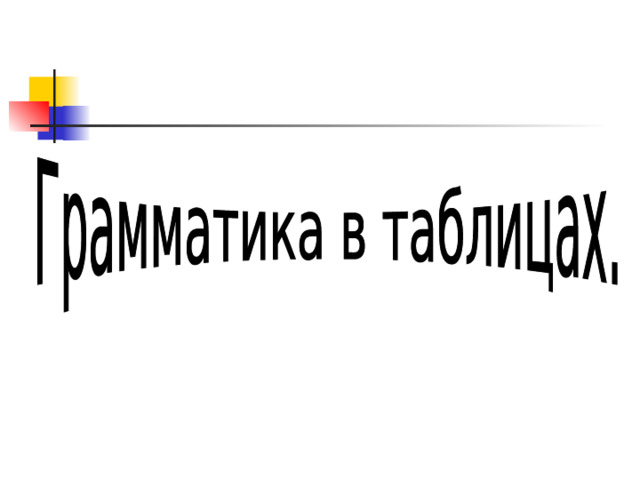
![Множественное число существительных. Существительное + (e)s. [s] [z] [iz] books boys houses stamps dogs boxes cats pens brushes НО! Potato es , tomato es , piano s .](https://fsd.kopilkaurokov.ru/up/html/2022/03/20/k_62376a14ebec5/img_user_file_62376a15b3ee0_10.jpg)
Множественное число существительных. Существительное + (e)s.
[s] [z] [iz]
books boys houses
stamps dogs boxes
cats pens brushes
НО! Potato es , tomato es , piano s .
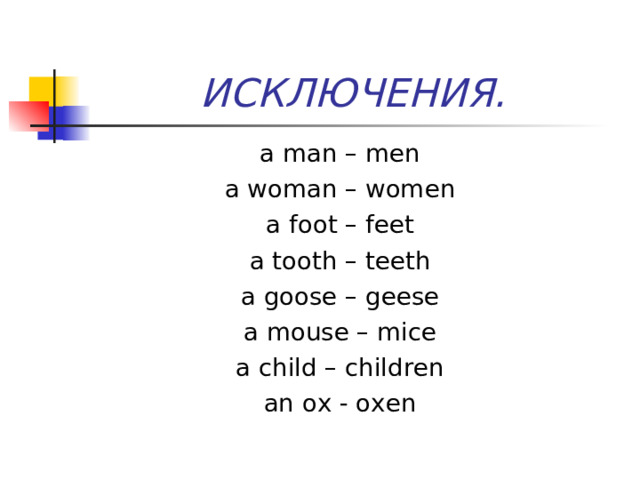
ИСКЛЮЧЕНИЯ.
a man – men
a woman – women
a foot – feet
a tooth – teeth
a goose – geese
a mouse – mice
a child – children
an ox - oxen
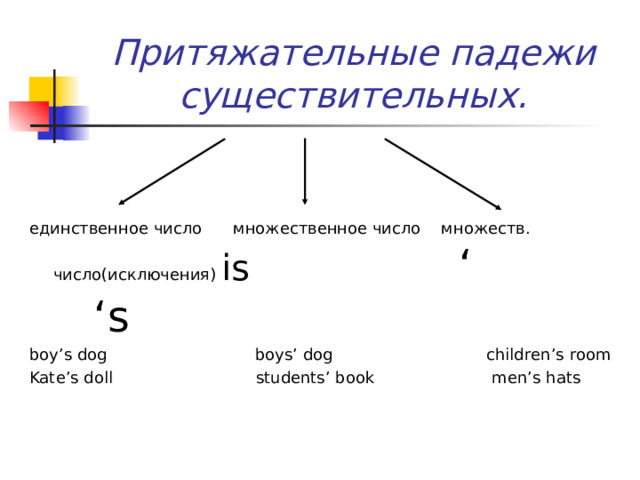
Притяжательные падежи существительных.
единственное число множественное число множеств. число(исключения) is ‘ ‘s
boy’s dog boys’ dog children’s room
Kate’s doll students’ book men’s hats
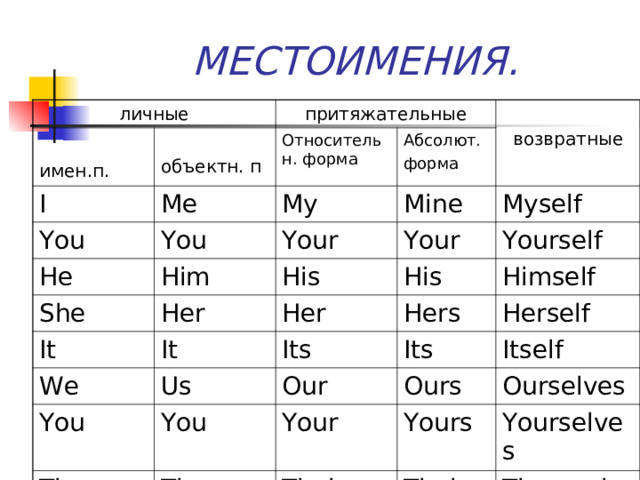
МЕСТОИМЕНИЯ.
личные
имен.п.
притяжательные
объектн. п
I
Относительн. форма
Me
You
He
Абсолют.
форма
My
возвратные
You
Him
Mine
Your
She
Your
His
Myself
It
Her
His
Yourself
Her
It
We
Himself
Hers
Its
You
Us
They
You
Our
Its
Herself
Ours
Itself
Your
Them
Ourselves
Yours
Their
Yourselves
Theirs
Themselves
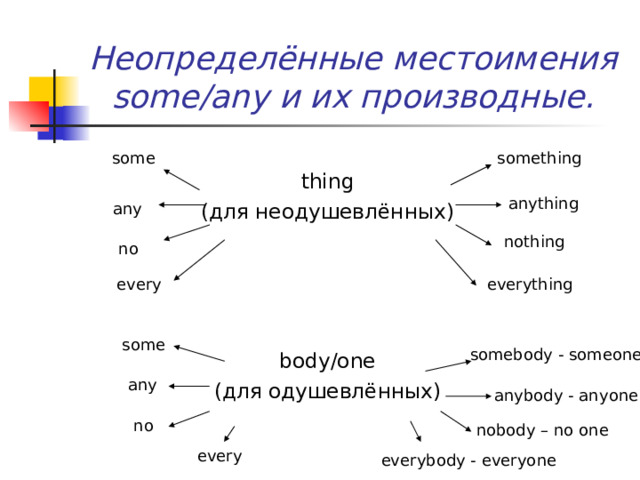
Неопределённые местоимения some/any и их производные.
something
some
thing
( для неодушевлённых )
body/one
( для одушевлённых )
anything
any
nothing
no
everything
every
some
somebody - someone
any
anybody - anyone
no
nobody – no one
every
everybody - everyone
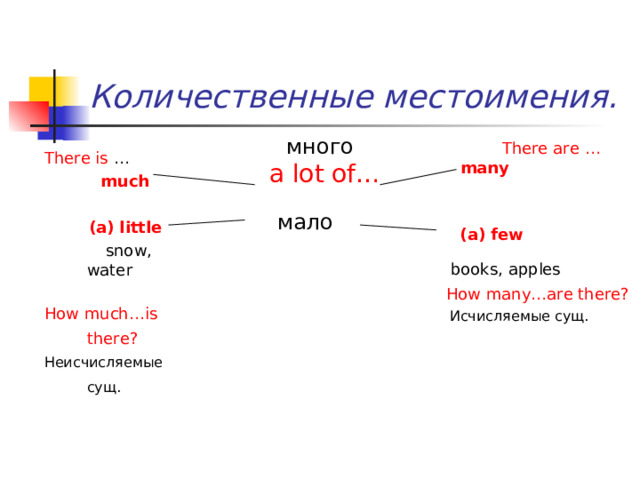
Количественные местоимения.
много
There are …
There is …
much
(a) little
snow, water
How much…is there?
Неисчисляемые сущ.
many
a lot of…
(a) few
мало
books, apples
How many…are there?
Исчисляемые сущ.
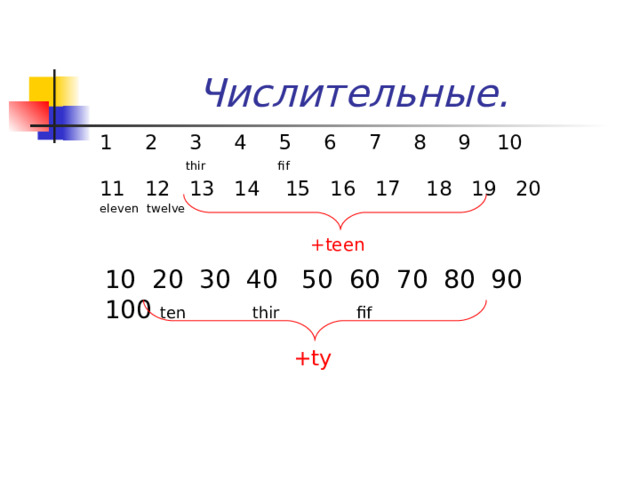
Числительные.
1 2 3 4 5 6 7 8 9 10
thir fif
11 12 13 14 15 16 17 18 19 20
eleven twelve
+teen
10 20 30 40 50 60 70 80 90 100 ten thir fif
+ty
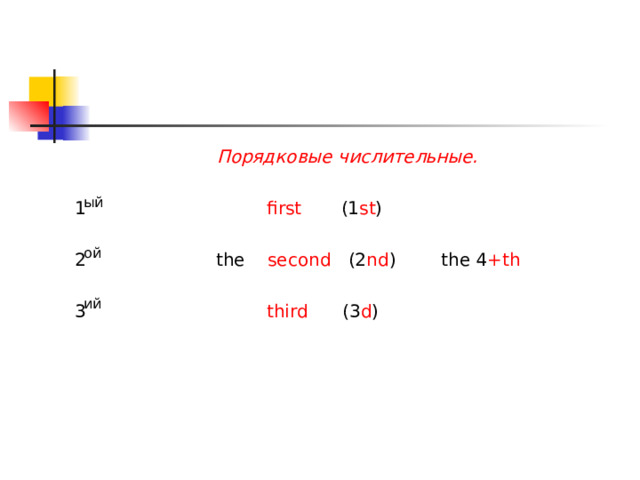
Порядковые числительные.
1 first (1 st )
2 the second (2 nd ) the 4 +th
3 third (3 d )
ый
ой
ий
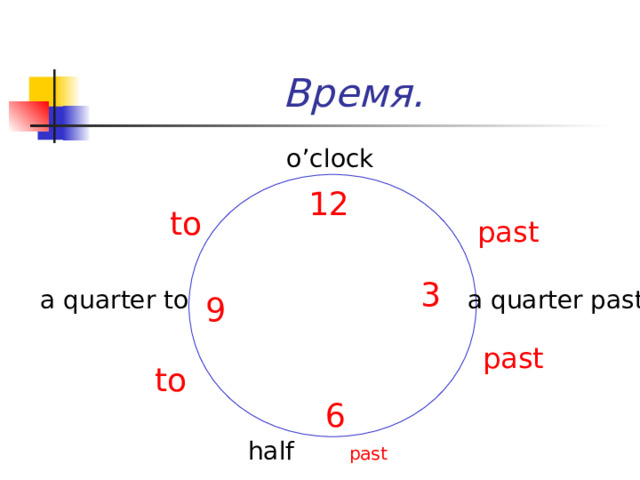
Время.
o’clock
12
to
past
3
a quarter to
a quarter past
9
past
to
6
half
past
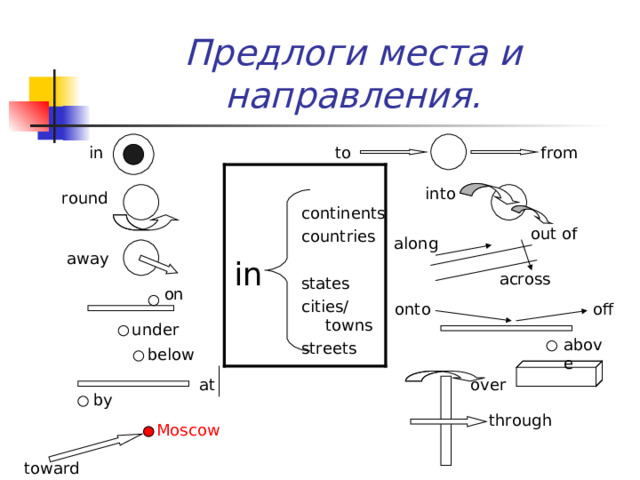
Предлоги места и направления.
from
in
to
into
round
continents
countries
states
cities/towns
streets
out of
along
away
in
across
on
off
onto
under
above
below
over
at
by
through
Moscow
towards
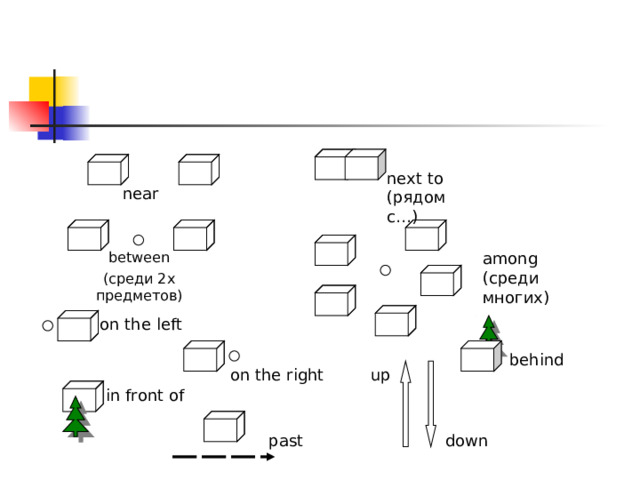
next to
( рядом с… )
near
between
( среди 2х предметов )
among
( среди многих )
on the left
behind
on the right
up
in front of
past
down
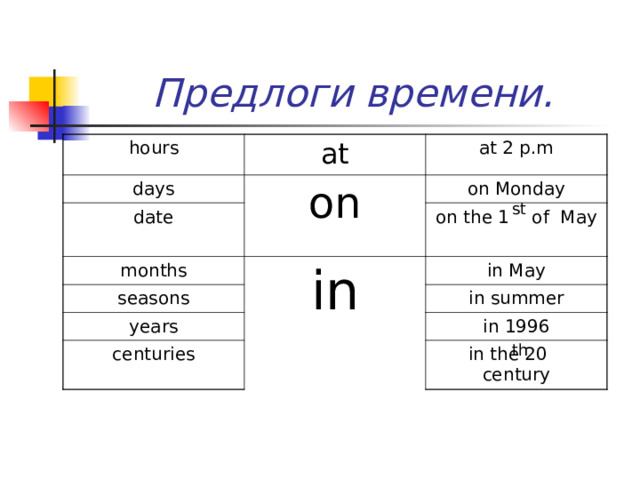
Предлоги времени.
hours
at
days
at 2 p.m
on
date
on Monday
months
seasons
in
on the 1 of May
in May
years
in summer
centuries
in 1996
in the 20 century
st
th
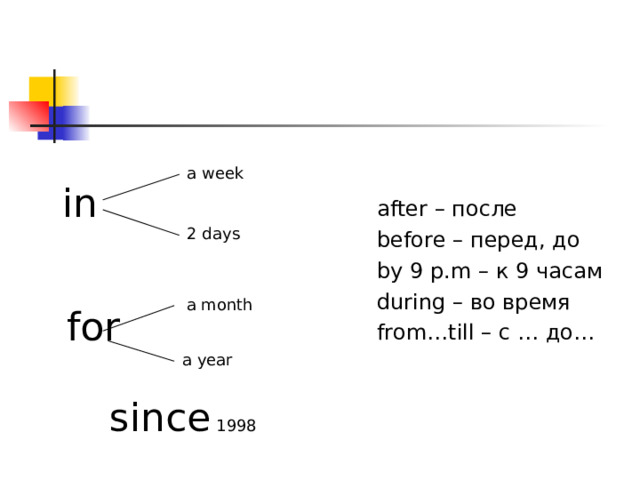
after – после
before – перед, до
by 9 p.m – к 9 часам
during – во время
from…till – с … до…
a week
in
2 days
a month
for
a year
since 1998
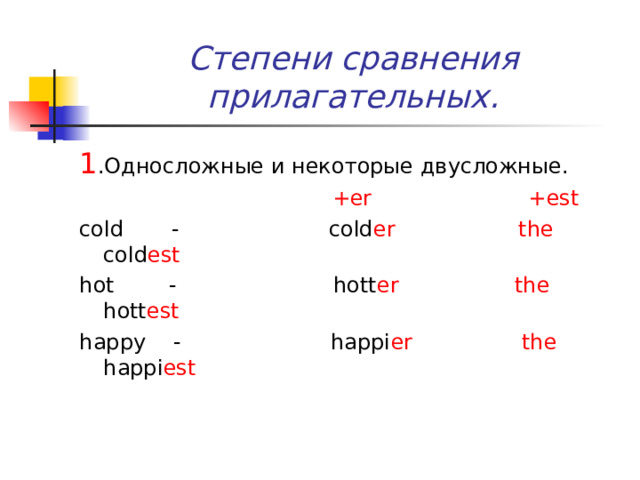
Степени сравнения прилагательных.
1 .Односложные и некоторые двусложные.
+er +est
cold - cold er the cold est
hot - hott er the hott est
happy - happi er the happi est
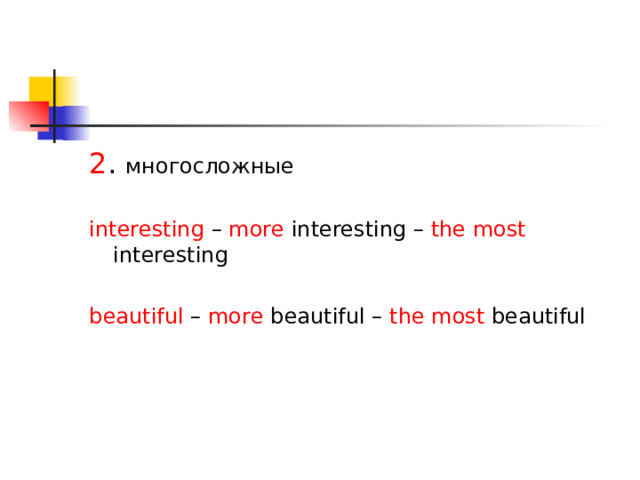
2 . многосложные
interesting – more interesting – the most interesting
beautiful – more beautiful – the most beautiful
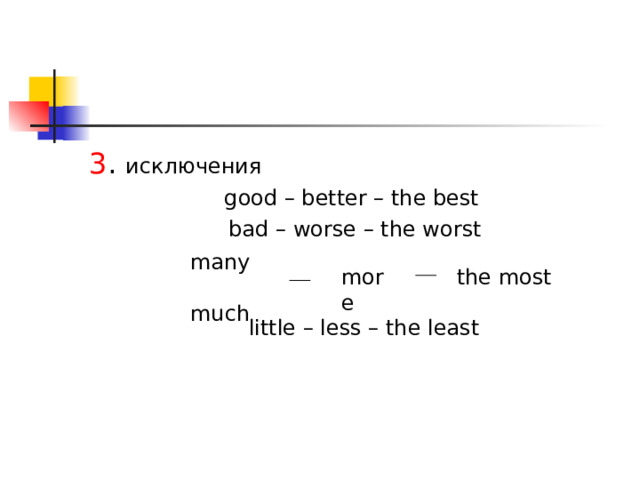
3 . исключения
good – better – the best
bad – worse – the worst
many
much
more
the most
little – less – the least
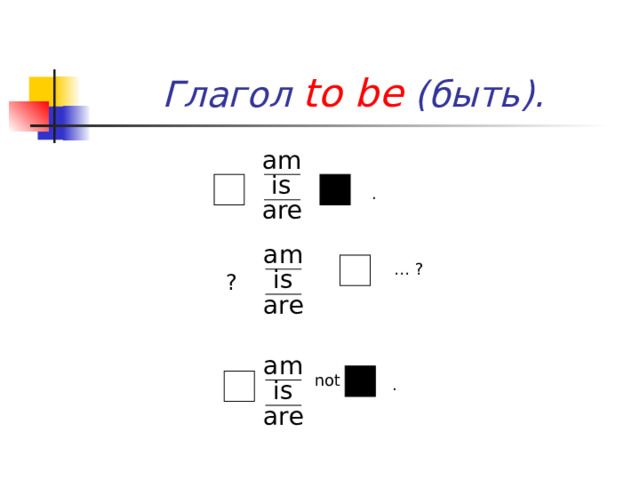
Глагол to be (быть).
am
is
.
are
am
… ?
is
?
are
am
not
is
.
are
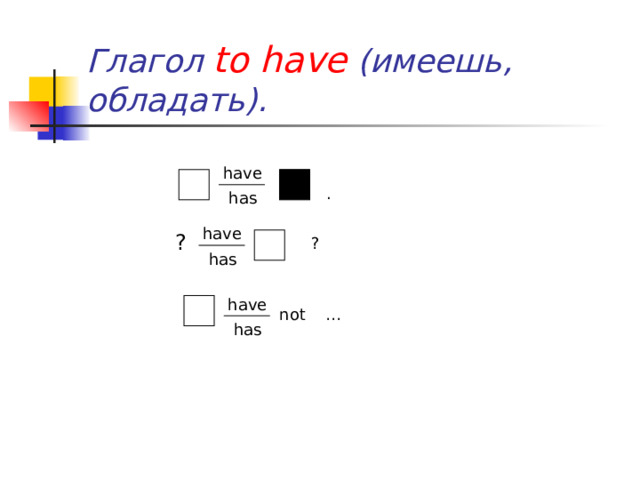
Глагол to have (имеешь, обладать).
have
.
has
have
?
?
has
have
not
…
has
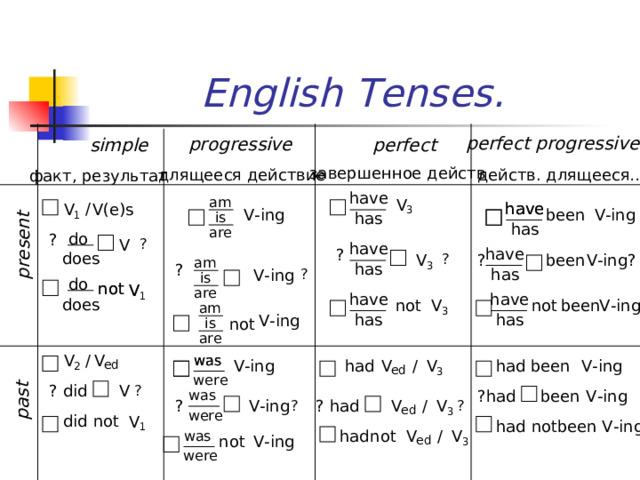
present
past
English Tenses.
progressive
perfect progressive
perfect
simple
завершенное действ
длящееся действие
факт, результат
действ. длящееся…
have
am
/
have
have
V
V
V(e)s
3
is
1
V-ing
has
been
V-ing
has
are
do
?
?
V
have
have
?
does
?
am
V-ing?
been
?
V
has
3
?
has
is
?
V-ing
do
not
not
V
V
are
have
have
1
does
not
not
am
been
V
V-ing
3
has
has
is
V-ing
not
are
/
was
was
V
V
V
/
V
had
V-ing
had
2
V-ing
ed
been
ed
3
were
?
V
did
?
was
V-ing
been
had
?
V-ing
?
?
/
?
?
had
V
V
ed
3
were
not
did
V
1
been V-ing
not
had
V
not
V
/
had
was
ed
not
V-ing
3
were
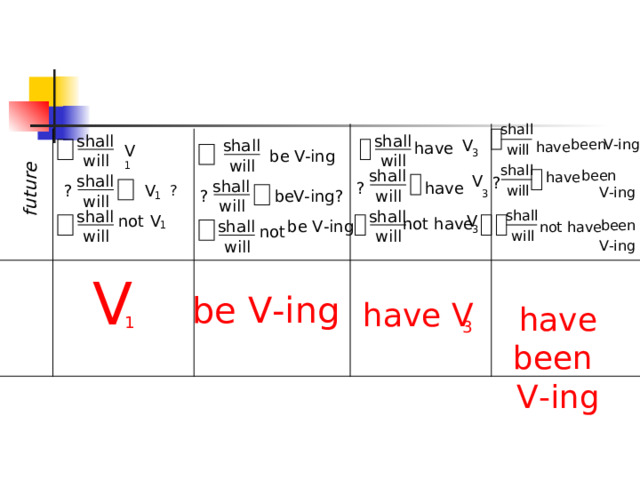
future
shall
shall
shall
V-ing
been
V
have
have
shall
will
V 1
V-ing
be
3
will
will
will
shall
shall
been
have
V
shall
?
have
shall
?
will
?
V-ing
?
V
V-ing?
3
?
be
1
will
will
will
shall
shall
shall
V
not
not have
V
1
been
not have
be V-ing
shall
not
3
will
will
will
will
V-ing
V
be V-ing
have been
V-ing
have V
1
3
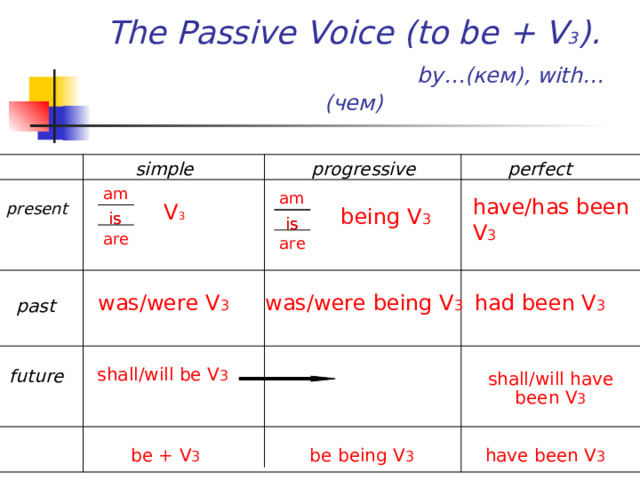
The Passive Voice (to be + V 3 ). by…( кем ) , with… (чем)
simple
progressive
perfect
am
am
have/has been V 3
V 3
present
being V 3
is
is
is
is
are
are
was/were V 3
had been V 3
was/were being V 3
past
shall/will be V 3
future
shall/will have been V 3
be + V 3
be being V 3
have been V 3
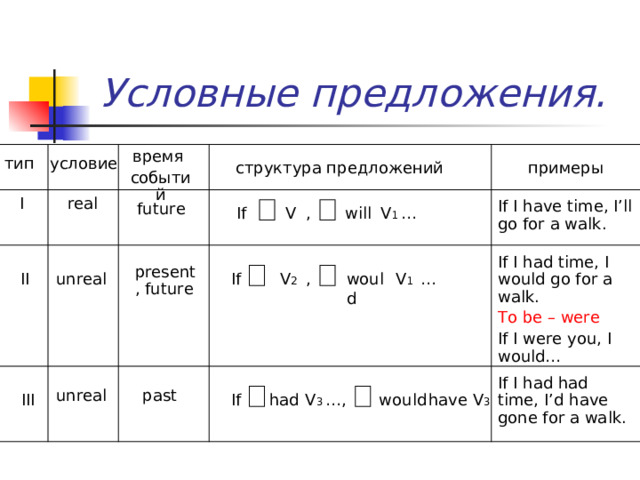
Условные предложения.
время
событий
условие
тип
структура предложений
примеры
I
real
future
If I have time, I’ll go for a walk.
…
V 1
will
,
V
If
If I had time, I would go for a walk.
To be – were
If I were you, I would…
present, future
would
…
V 1
V 2
unreal
,
II
If
If I had had time, I’d have gone for a walk.
unreal
past
III
If
had
V 3
… ,
would
have V 3
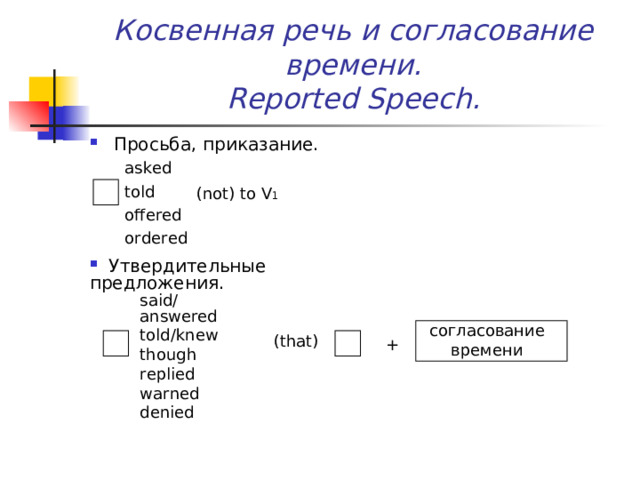
Косвенная речь и согласование времени. Reported Speech.
asked
told
offered
ordered
(not) to V 1
- Утвердительные предложения.
said/answered
told/knew
though
replied
warned
denied
согласование
времени
(that)
+
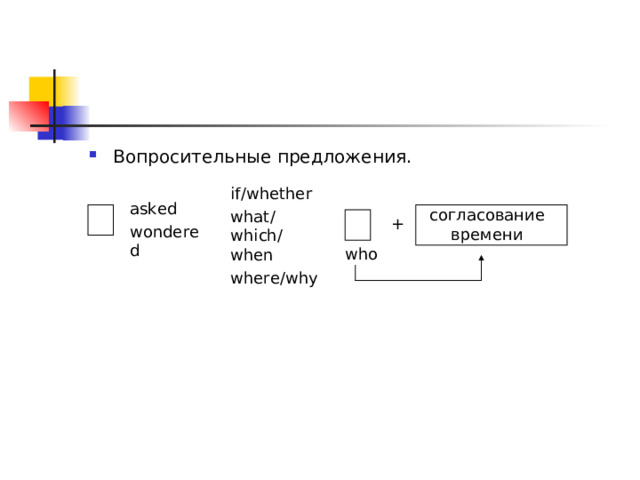
- Вопросительные предложения.
if/whether
what/which/when
where/why
asked
wondered
согласование
времени
+
who
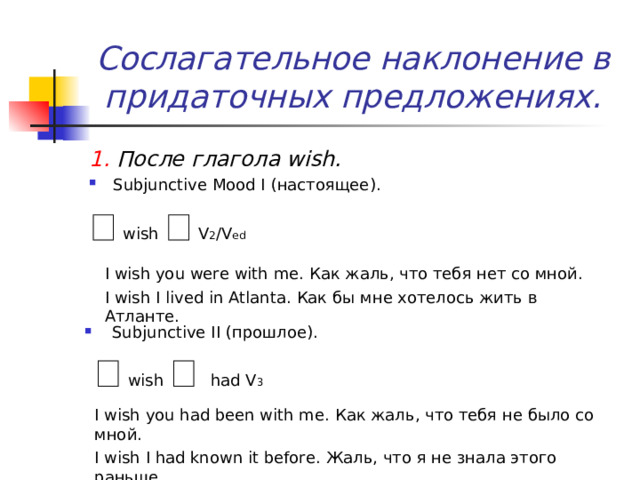
Сослагательное наклонение в придаточных предложениях.
1. После глагола wish.
- Subjunctive Mood I (настоящее).
wish
V 2 /V ed
I wish you were with me. Как жаль, что тебя нет со мной.
I wish I lived in Atlanta. Как бы мне хотелось жить в Атланте.
- Subjunctive II ( прошлое ) .
wish
had V 3
I wish you had been with me. Как жаль, что тебя не было со мной.
I wish I had known it before. Жаль, что я не знала этого раньше.
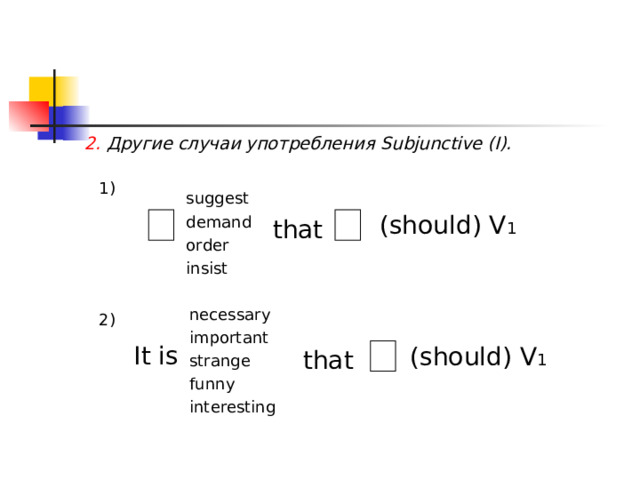
2. Другие случаи употребления Subjunctive ( I ) .
1)
suggest
demand
order
insist
(should) V 1
that
necessary
important
strange
funny
interesting
2)
It is
(should) V 1
that
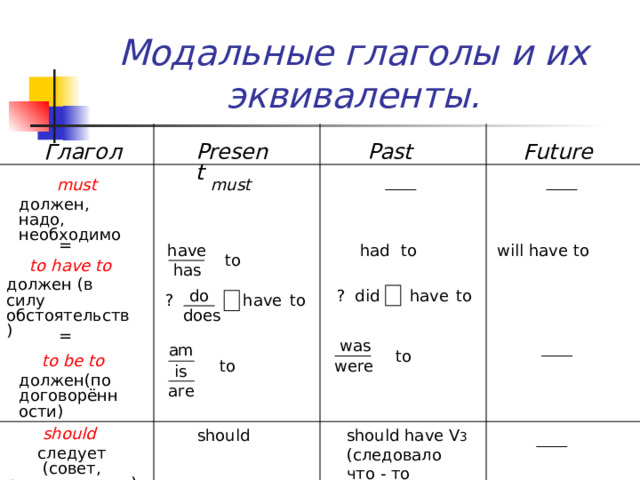
Модальные глаголы и их эквиваленты.
Глагол
Present
Past
Future
must
must
должен, надо, необходимо
=
have
to
will have to
had
to
to have to
должен (в силу обстоятельств)
has
?
did
have
to
do
have
?
to
does
=
am
was
to
to be to
должен(по договорённости)
to
were
is
are
should
should have V 3
( следовало что - то сделать )
should
следует (совет, рекомендация)
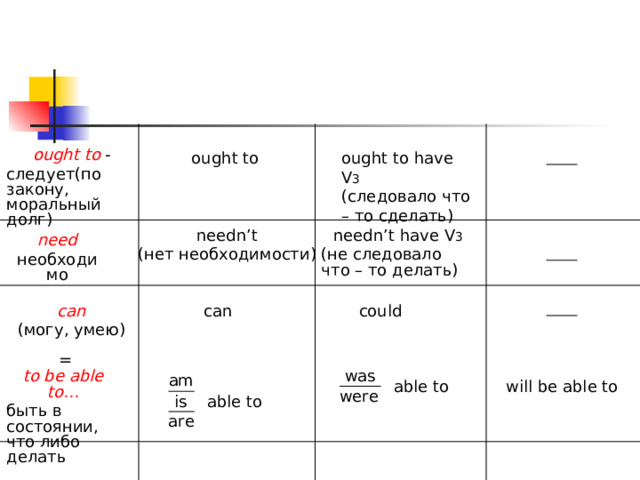
ought to have V 3
( следовало что – то сделать )
ought to -
следует(по закону, моральный долг)
ought to
needn’t have V 3
(не следовало что – то делать)
needn’t
( нет необходимости )
need
необходимо
can
( могу, умею )
could
can
=
am
to be able to…
быть в состоянии, что либо делать
was
able to
will be able to
were
able to
is
are
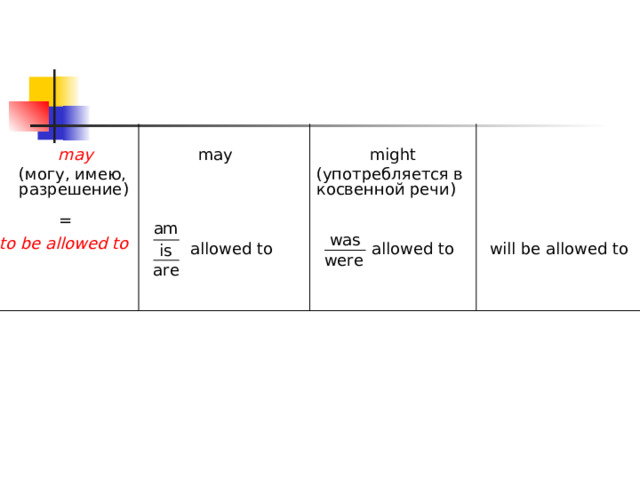
might
( употребляется в косвенной речи )
may
may
( могу, имею, разрешение )
=
am
to be allowed to
was
allowed to
allowed to
will be allowed to
is
were
are
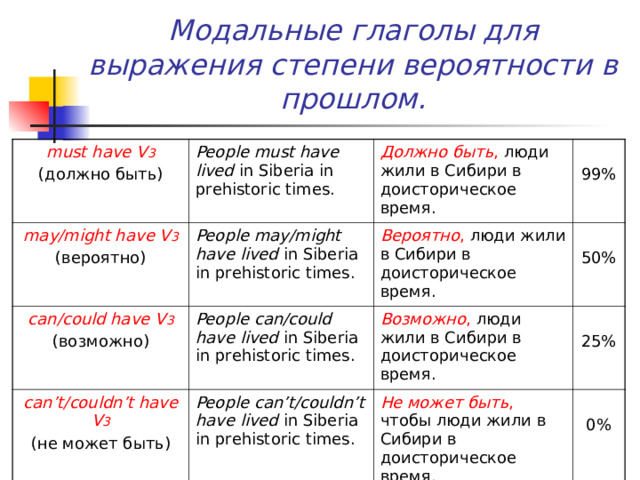
Модальные глаголы для выражения степени вероятности в прошлом.
must have V 3
( должно быть )
People must have lived in Siberia in prehistoric times.
may/might have V 3
( вероятно )
People may/might have lived in Siberia in prehistoric times.
Должно быть , люди жили в Сибири в доисторическое время.
can/could have V 3
(возможно)
can’t/couldn’t have V 3
( не может быть )
99%
Вероятно , люди жили в Сибири в доисторическое время.
People can/could have lived in Siberia in prehistoric times.
People can’t/couldn’t have lived in Siberia in prehistoric times.
50%
Возможно , люди жили в Сибири в доисторическое время.
25%
Не может быть , чтобы люди жили в Сибири в доисторическое время.
0%
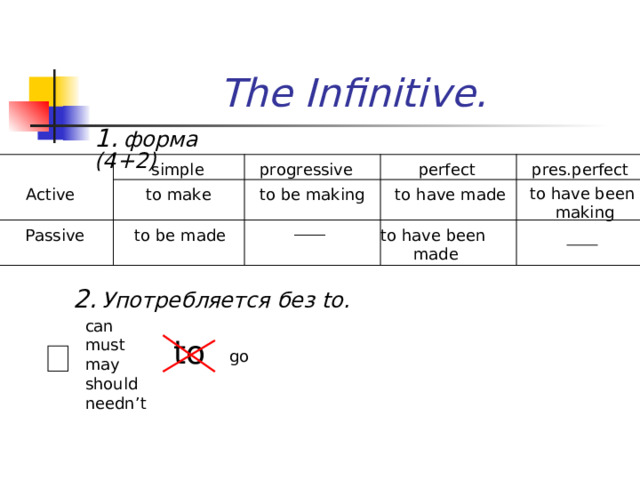
The Infinitive.
1. форма (4+2)
progressive
pres.perfect
simple
perfect
to have been
making
to be making
Active
to make
to have made
to have been
made
to be made
Passive
2. Употребляется без to.
can
must
may
should
needn’t
to
go
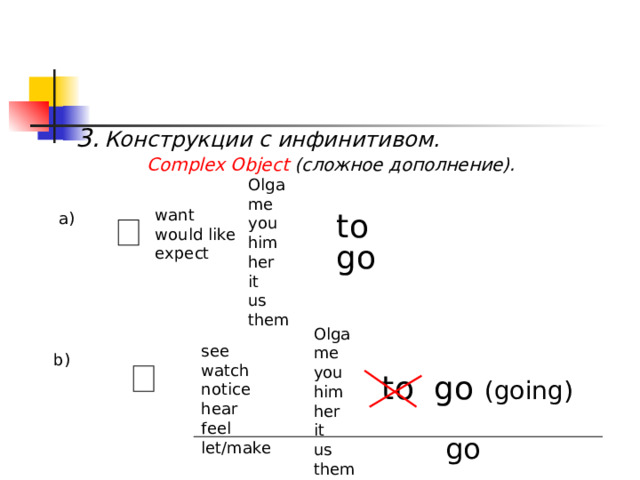
3 . Конструкции с инфинитивом.
Complex Object (сложное дополнение).
Olga
me
you
him
her
it
us
them
a)
want
would like
expect
to go
Olga
me
you
him
her
it
us
them
see
watch
notice
hear
feel
let/make
b)
to go (going)
go
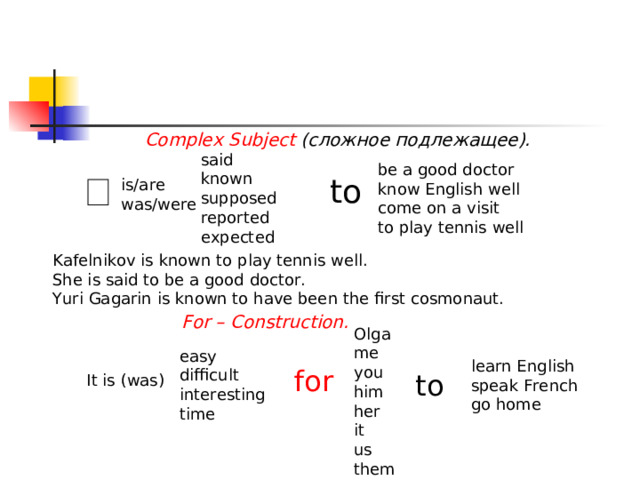
Complex Subject ( сложное подлежащее ).
said
known
supposed
reported
expected
be a good doctor
know English well
come on a visit
to play tennis well
is/are
was/were
to
Kafelnikov is known to play tennis well.
She is said to be a good doctor.
Yuri Gagarin is known to have been the first cosmonaut.
For – Construction.
Olga
me
you
him
her
it
us
them
easy
difficult
interesting
time
learn English
speak French
go home
to
It is (was)
for
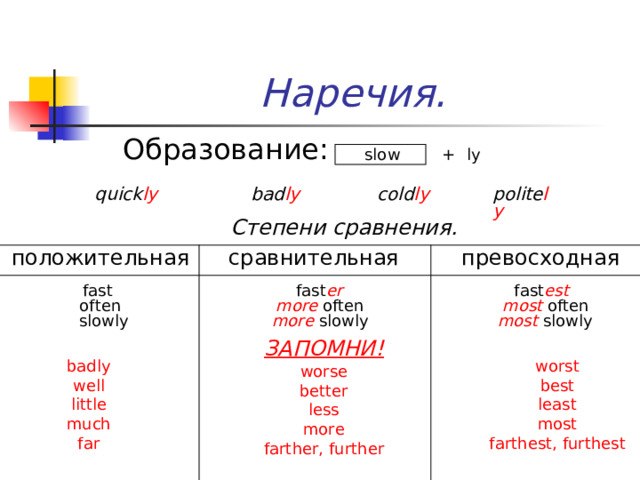
Наречия.
Образование:
slow
+
ly
quick ly
bad ly
cold ly
polite ly
Степени сравнения.
сравнительная
положительная
превосходная
fast
fast er
fast est
often
more often
most often
slowly
more slowly
most slowly
ЗАПОМНИ!
badly
well
little
much
far
worst
best
least
most
farthest, furthest
worse
better
less
more
farther, further
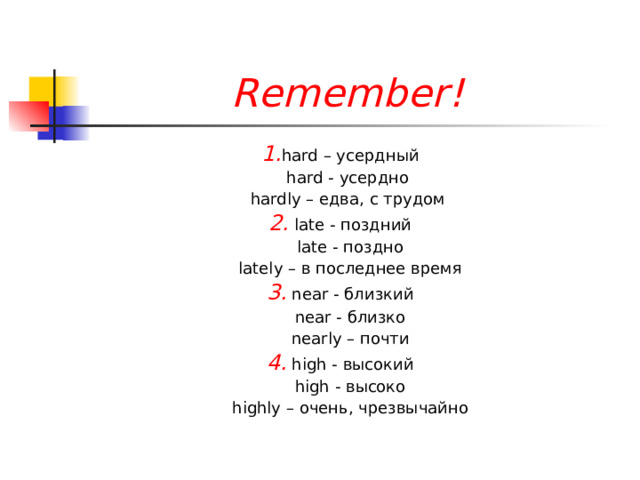
Remember !
1 . hard – усердный
hard - усердно
hardly – едва, с трудом
2. late - поздний
late - поздно
lately – в последнее время
3. near - близкий
near - близко
nearly – почти
4. high - высокий
high - высоко
highly – очень, чрезвычайно










![Множественное число существительных. Существительное + (e)s. [s] [z] [iz] books boys houses stamps dogs boxes cats pens brushes НО! Potato es , tomato es , piano s .](https://fsd.kopilkaurokov.ru/up/html/2022/03/20/k_62376a14ebec5/img_user_file_62376a15b3ee0_10.jpg)


















































